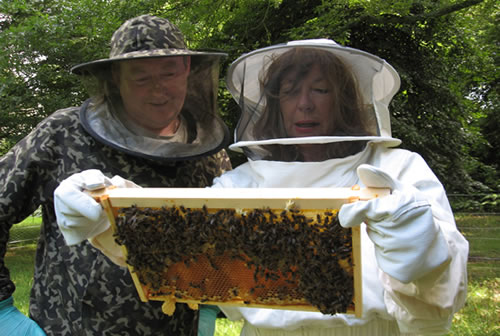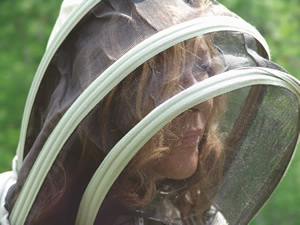
Arriving home after sixteen months travelling around the Mediterranean in quest of the history of the olive tree, I discovered that the fourteen honeybee colonies that had been residents on our Olive Farm for over a decade had died off or disappeared. I telephoned the beekeeper who had always tended the hives during our absences and learned that he had was on the point of bankruptcy. Out of his entire stock of 103 colonies, only a handful had survived...
When such devastation hit us directly I began to look into the problem in more depth. What had been the cause of this destruction?
I learned that pollinators, particularly honeybees, are under serious threat. They need our help. A third of the western world’s honeybees have disappeared. Pesticides, habitat loss, parasites, intensive farming, all have been cited as causes and I believe there is an urgent need for awareness about land management. I also believe that no matter where we live, no matter how small our patch (even window-boxes) we have the possibility to help avert this deepening of this crisis.
I have created this page on the website because I want to be able to keep abreast with what his happening in the world of apiary and to share what I am learning. You can email me, offering your thoughts and feedback - whether an expert or novice, I am keen to hear from you and your experiences.
A few facts to reflect upon
Honey bees are the only insects that produce food for humans.
It is estimated that about a third of the food in your local store, épicerie, greengrocer’s, depends on honey-bee pollination.
Honey bees visit approximately two million flowers to produce ONE pound of honey.
To produce TWO pounds of honey, our little girls travel a distance equal to four times around the earth.
Please let us protect and save our honey bees
BEE AWARE
Become a beekeeper if you are able to, and the idea appeals to you. If that does not appeal or is not feasible:
- Plant up window boxes
- Rethink your garden without lawns
- Leave the daisies and dandelions – they feed the bees
- Resuscitate unused plots, corners of lands and road verges with nectar-rich plants
- Plant nectar-rich wildflowers wherever you can in order that colonies of honeybees can survive at peace, foraging the land and its gifts without threat
Another alternative is a scheme the British Beekeepers Association (BBKA) runs called Adopt A Beehive - www.adoptabeehive.co.uk
If you live outside Britain and you have links to other associations, please let us know them.
We do not put tick collars on our dogs or use insect-repelling products against the ticks because those on the market here in France contain imidacloprid
I have come across this insecticide ingredient before. It is an ingredient within the pesticide sprayed onto sunflowers here in France and has been judged to have a very detrimental effect on honeybees. Click here to read a wikepedia link about it. There is also plenty of info on this subject in RETURN TO THE THE OLIVE FARM
If you would like to get in touch with beekeepers, you can do so via the London Beekeepers Association
John Chapple, the chairman of the London Beekeepers' Association
123 Perryn Road, London, W3 7LT
Tel: 020 8749 7773
john.chapple@lbka.org.uk
This is rather novel for those who would like a designer hive in their house.
Get the freshest ever honey with a wall-mounted urban bee-hive
Global Bee Emergency petition
Friends, this one is urgent. I realise that AVAAZ, who I consider an excellent organisation, may have simplified the issue here because loss of habitat is also a cause of concern for bee loss. But the most important fact is TO SIGN their petition. Please do if you agree with this.
Global bee emergency – act now!
HM Government petition
I, along with many others, including quite a few readers from my Facebook page, signed a petition last year to beg the British government to seriously and in all conscience consider the withdrawal of neonicotinoids pesticides from the market. These chemicals almost certainly damage the nervous systems of bees and other insects. I have already posted the government’s response on this page, which was not only a negative but the numbers they claimed had signed the petition was far short of the figure I saw when I signed.
I believe that in time to come the damage caused to insects, to the environment and to man will be made public. In Return to the Olive Farm, I have recounted stories about the cover-up of asbestos damage to man’s health, which was denied for decades. I believe we are looking at a similar form of cover-up now.
There is a great deal of money being made by chemical companies out of the use of these pesticides. There is also, in my opinion, a great deal of waffle being spoken about what is damaging honey bees
The fact is bees are at risk and time is running out. Read more here
» Click here to see the Government's response to the petition
Here is my response to their decision:
Dear Sirs,
I think your decision is disappointing and exceedingly worrying. I am an author, actress and environmental activist and I intend to continue to fight all governments who make such decisions as set out here in your argument. In my opinion you are acting in alliance with the pesticide companies and not making decisions for the future health of the environment or mankind.
I beg you to reconsider.
Carol Drinkwater
Beekeepers Fume at Association's endorsement of fatal insecticides
I think for those who live in Britain and are beekeepers this is a very disappointing news item. There is talk now of setting up an alternative Bee Association. Of course, it was not ALL members who have made the deal with the chemical companies and there will certainly be investigation... All the same, not an inspiring direction for all those who are keen to support the plight of bees...
Do go to my Facebook page, OLIVE FARM, and let me know what you think and PLEASE do consider signing the AVAAZ petition (posted above).
Read the article in the Independent
This was sent to me from a reader in Lithuania and would be worth a visit if over that side of eastern Europe
Lithuanian Museum of Ancient Beekeeping - Wikipedia, the free encyclopedia
A moment’s delight I found on the BBC page
BBC News - How bees perform perfect landing
If you have been to the AVAAZ site, you will have seen the following links. If not, they may also be of interest:
» Bee decline could be down to chemical cocktail interfering with brains
» Bee briefing
» $15 Billion Bee Murder Mystery Deepens
» “Nicotine Bees " Population Restored With Neonicotinoids Ban
» EPA memo reveals concern that pesticide causes bee deaths
» Beekeepers want government to pull pesticide
» Bees in freefall as study shows sharp US decline
» Pesticide industry involvement in EU risk assessment puts survival of bees at stake
» Vanishing of Bees provide details on the EPA leaked documents
I have just returned from a brief trip to the Yorkshire Dales, the old haunts where we filmed All Creatures Great and Small. I discovered some terrific initiatives happening there. Do take a look at these links:
» http://www.wharfedalebka.org.uk/
» http://www.yorkshiredales.org.uk/index/natureinthedales/wildlifeprojects/haytime.htm
The following is a short extract from the House of Commons Report entitled BEES AND THEIR PROBLEMS last updated 18 November 2011. Neonicotinoids are a relatively recent type of insecticides used on crops.
"Information from standard tests and field studies, as well as incident reports involving other neonicotinoid insecticides, suggest the potential for long term toxic risk to honey bees and other beneficial insects."
Alarm bells should be ringing by now. Neonicotinoids are a group of relatively new compounds that mimic the insect-killing properties of nicotine. They are neurotoxins, attacking the central nervous system of the invertebrates. They are systemic, which means that they get taken into every part of the plant, including the pollen and nectar.
In turn, that means that bees and other pollinating insects can absorb them and carry them back to their nests or hives.
In 2008, total neonicotinoid use in Britain involved more than 2.5 million acres - some quarter of the arable cropland in this country - and they are big earners for the chemical companies that produce them.
If you have time, this is well worth reading:
Is the future of bees in the hands of the pesticide lobby?
This Facebook page is wonderful, do take time to look through it. It offers many other links to Bee Awareness too.
You may want to sign this petition
This is fun – how to build a bumblebee nest
This seems to be an excellent Dutch site from the university of Utrecht regarding the decreasing numbers of bees. It is also written in English and French so we can all engage with it.
And this one is from Harvard School of Public Health. They will be following this up the study, due to be published in June 2012
If you are on Facebook, this is an interesting page to 'like'
And for those in the US, this poster helps spot the pollinators!
The Peace Bee Farm is in Arkansas, United States. Its owner, Richard Underhill, makes some very interesting observations about his bees and the world of the honey bee. Well worth scrolling through.
Here is an excellent piece. Well worth taking the time to read.
This is a terrific initiative..
Part science part art pollinator pathway connects seattle green spaces
Friends of Earth have a petition to help the Bee Cause. I have signed it. Perhaps you would like to as well?
This photograph is quite extraordinary. Thousands of bees delayed a Pittsburgh Delta flight. Pittsburgh is the home-base of the giant chemical company, Bayer.
Another Help the Bee petition if you feel inclined to sign it.
If you are fond of bumblebees and living in Britain, this would be a great organisation to join.
They have terrific initiatives for the youngsters amongst us.
This is a wonderful Facebook page that offers so much information on bees and those working with bees. Do take a look
Whatever you decide, the next time you pour a spoonful of honey, celebrate the extraordinary creature that brought it to your table. Remember, honeybees are endangered. Help the Honeybee. Without her, our diet will be a paltry one.

|